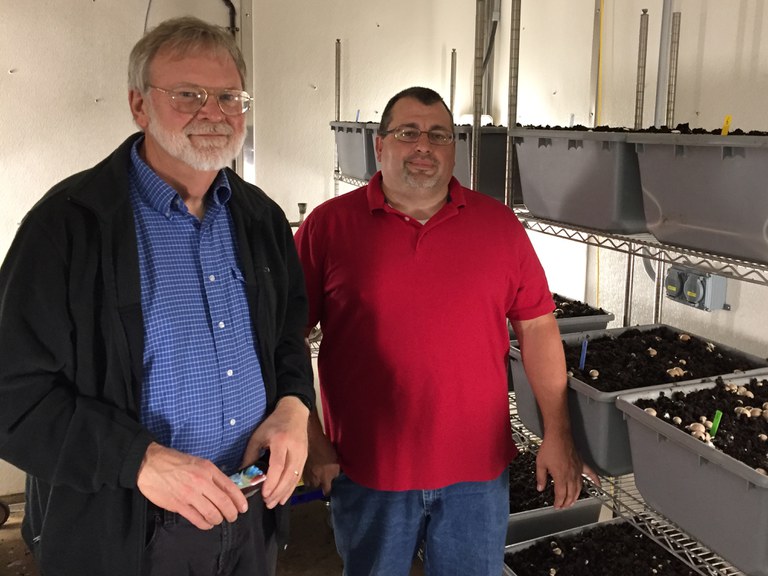Posted: April 29, 2018
Steven E. Lindow, professor and executive associate dean for the College of Natural Resources at the University of California, Berkeley, was the guest speaker at the Richard R. Nelson Memorial Lecture Series, on April 23, 2018, in Buckhout Laboratory at Penn State's University Park campus.

Steven Lindow (left) and John Pecchia tour the Mushroom Research Center at Penn State. (Image: Kevin Hockett)
UNIVERSITY PARK, Pa. - Steven E. Lindow, professor and executive associate dean for the College of Natural Resources at the University of California, Berkeley, was the guest speaker at the Richard R. Nelson Memorial Lecture Series, on April 23, 2018, in Buckhout Laboratory at Penn State's University Park campus. Following the lecture, Dr. Lindow and members of Plant Pathology and Environmental Microbiology held social hour at Whiskers at the Nittany Lion Inn on campus.
In addition to delivering the memorial lecture, Dr. Lindow met with faculty from departments in the College of Agricultural Sciences and College of Science and enjoyed lunch with graduate students from PPEM. Dr. John Pecchia, director of the Mushroom Research Center, gave the speaker a tour of Penn State's one-of-a-kind mushroom research facility. In addition to seeing and learning about research efforts at Penn State, Dr. Lindow's visit included a short hike at Shingletown Gap, and was capped-off with ice cream from Berkey Creamery (no sprinkles).
Hosted this year by Kevin Hockett, assistant professor of microbial ecology, and the Department of Plant Pathology and Environmental Microbiology in the College of Agricultural Sciences, the lectures are supported by an endowment established by the late Nelson, a champion of plant pathology and an Evan Pugh Professor. His goal was to enhance graduate education in plant pathology at Penn State through this initiative.
Lindow, who has received a number of awards and honors since joining Berkeley in 1978, has led teams in developing creative ways to study microbial interactions on and with plants, according to Carolee Bull, professor and head of the Department of Plant Pathology and Environmental Microbiology.
"Steve is a giant among plant pathologists," she said. "Although a plant pathologist by training, he hasn't favored pathogens over nonpathogens and is known for his advances with both epiphytes and plant pathogenic bacteria. The insights Steve and members of his lab have developed have opened up new areas of study and will be driving microbial ecology and phytobiome research for years to come."
In addition to the excellence of his research program, Lindow is well regarded for his mentorship, according to Hockett, a former doctoral advisee, who said, "Steve was always generous with his time and thoughtful feedback. Of the many skills I learned while in his lab, the foremost were to think quantitatively about data and to be open to new and innovative ways of approaching a research question."
Lindow is a native of Oregon. He received his bachelor of science degree from Oregon State University before completing his doctorate at the University of Wisconsin. He is a member of the National Academy of Sciences and has been named as a fellow in the American Phytopathological Society, the American Association for the Advancement of Science and the American Academy of Microbiology.
He has authored more than 175 research articles and 70 reviews and has trained numerous graduate students and postdoctoral scholars who have gone on to successful careers in academic, governmental and private institutions.
 From left to right: Hanareia Ehau-Taumaunu, Prem Prasad Kandel, Steven Lindow, Kevin Hockett
From left to right: Hanareia Ehau-Taumaunu, Prem Prasad Kandel, Steven Lindow, Kevin Hockett
(Image: Nancy Wenner)

